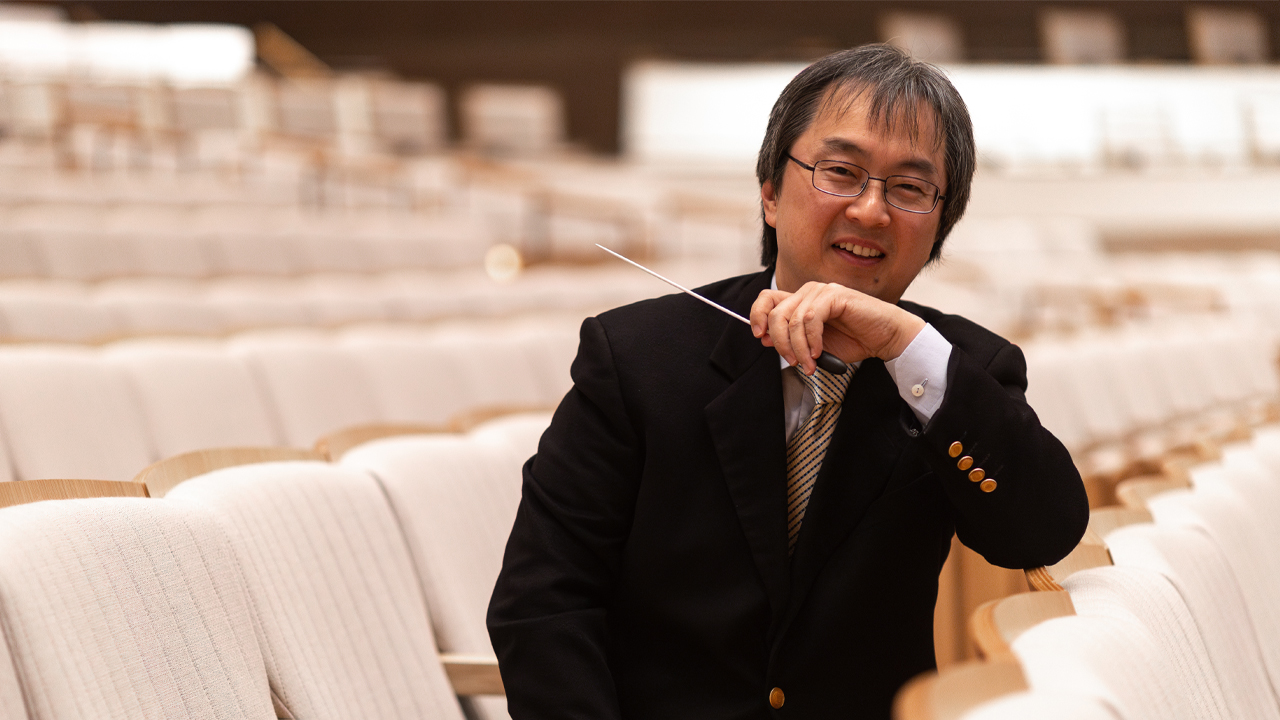David Cho in the Buddy Holly Hall of Performing Arts and Sciences. Photo by Olivia Raymond
The clock moves from 6:59 p.m. to 7 o’clock.
As the second hand lands on the 12, David Cho takes the podium in front of the Lubbock Symphony Orchestra. The clock acts as a sort of down beat and Cho is never behind tempo.
They’re in a final rehearsal before an upcoming September concert. The Lubbock Chorale stands at the back of the stage, joining the symphony for a performance titled, “Beethoven Strikes Again.”
It’s 88 degrees outside. Cho has an Eddie Bauer jacket in his sparse dressing room backstage, along with unsalted cashews, a few Kleenex and his laptop.
The auditorium itself is aggressively air conditioned, but Cho is in khakis and a black cotton shirt. He moves enough to keep warm.
“Subdivide!” he reminds string players as they move through Beethoven’s Symphony No. 4.
Cho gives each definitive beat, but if there’s a run of notes between beats, the musicians count themselves – subdividing. It’s in these small seconds a performance comes to life – or goes wrong.
After all, the first thing Cho learned about conducting is there’s a lot outside his control.
When: 7:30 p.m., Saturday, Nov. 16
Where: Buddy Holly Hall of Performing Arts and Sciences
Details: LSO will play Brahms’ Symphony No. 1 and Violin Concerto.
Also: The Hannah Jackson Band will perform at 5:30.
Tickets: lubbocksymphony.org
The electricity
Cho had varied interests growing up, but music was a constant. The conductor spent his first 11 years Seoul, South Korea.
“My dad should have been a conductor,” Cho said of his father who had musical talent. However, growing up during the Korean War, Cho’s father Young Joo – who later went by John in America – was encouraged to pursue a more secure job.
Cho’s mother was a conservatory-trained lyric soprano. She stopped performing when the couple married before they had David and his younger brother.
His parents valued the performing arts.
“I think my father liked living vicariously through me in that way,” he said.
On a warm June evening when Cho was 6 years old, his family had tickets to a symphony concert at the Sejong Center for the Performing Arts. Cho’s grandmother dressed him in his finest clothes and herded him down the aisle before the lights dimmed.
The boy settled in between his grandmother and his parents, straining to see over the adults seated in front of him. The first grader had reservations about being dressed up and taken to the concert hall, but his interest was piqued as a man of average height, but intense energy took the podium.
The conductor quickly threw up his hands and captured the musicians’ eyes for no more than a second before a brass fanfare abruptly commenced Schumann’s Symphony No. 1.
The conductor was Leonard Bernstein – on tour with the New York Philharmonic.
“I remember the electricity,” Cho recalled.
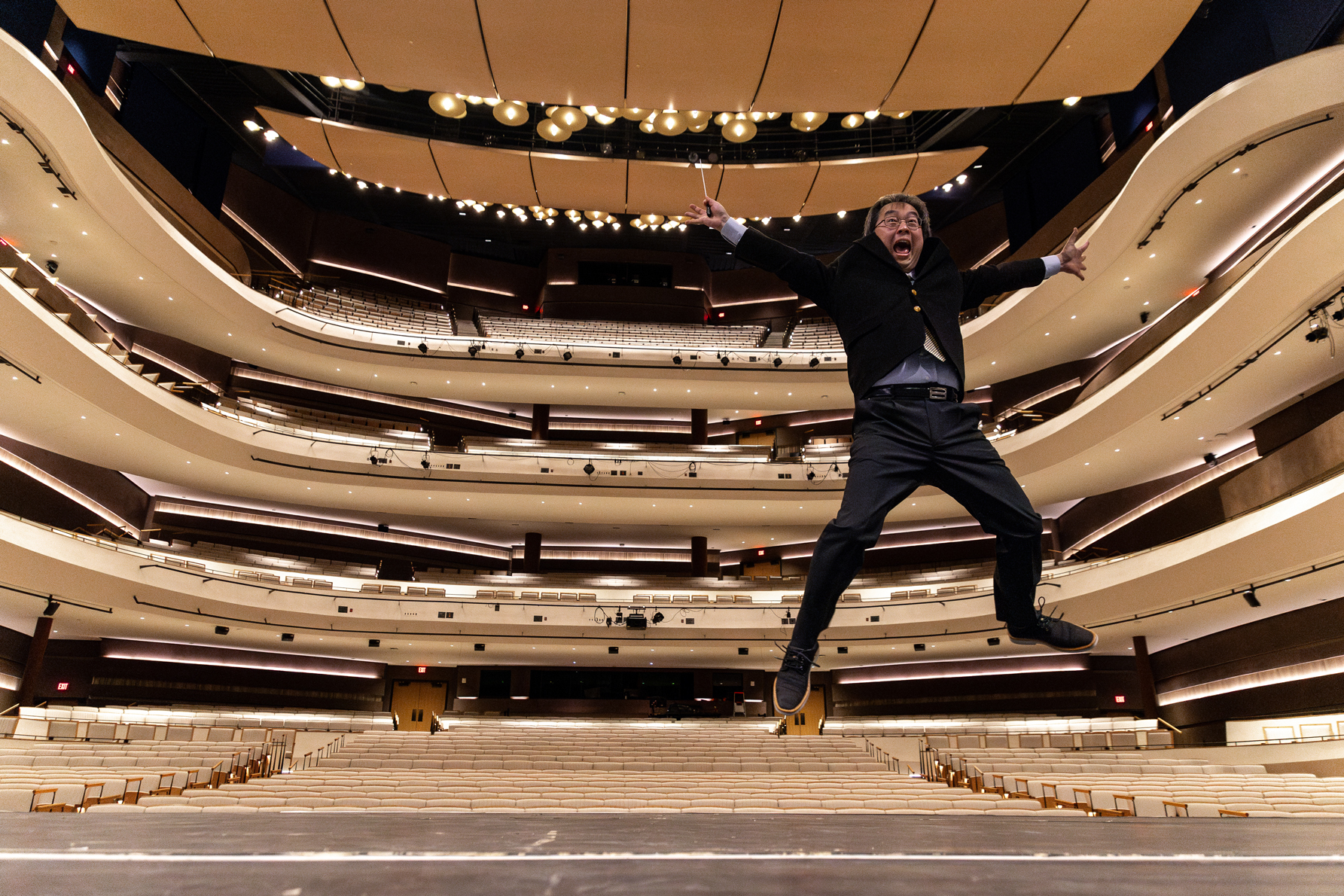
At six years old, he doesn’t remember as much as he’d like. But he’ll never forget the feeling. A few years later he was deeply moved by the soundtrack to “E.T.,” a film score written by John Williams.
Young Cho was deeply affected by the performances.
His parents paid for their sons to take classical guitar and piano lessons.
John was an enthusiastic entrepreneur, always wrapped up in the next big idea, traits Cho admired.
When Cho was still in grade school, his father took a trip to Europe where he ate at a McDonald’s for the first time. Struck by the rich food, John came home and started a fast-food restaurant with golden arches. He interpreted the logo as more of a beacon for good food than trademarked property.
He had great success.
Six months later a cease-and-desist letter from McDonald’s arrived.
From piano to podium
Cho’s family immigrated to Southern California to become restaurateurs when he began middle school.
“I remember landing at LAX and immediately going to a Carl’s Jr. The double cheeseburger was so big it took me three days to finish,” Cho said.
The family settled in the upscale community of Rancho Palos Verdes and Cho continued his music studies.
He also became a baseball fan and it taught him life lessons while watching the 1986 World Series.
The Boston Red Sox had not won a World Series since 1918. They were favored to win, erasing a 68-year drought called the “Curse of the Bambino,” after they sold Babe Ruth to the Yankees in 1920.
In the bottom of the 10th inning of Game Six, Boston was an out away from winning the series against the New York Mets. Mookie Wilson hit a ground ball to first base in what should have been an easy final out, but the ball inexplicably rolled through the legs of Boston’s Bill Buckner. Cho’s after-school snack almost fell out of his mouth.
“The Mets took that momentum and won Game Six and then Game Seven. I don’t know how Buckner lived with himself after that,” Cho said.
The lesson remained in Cho’s mind. Even with experience and practice, anything can happen.
Cho played catcher for his Little League team but dragged his feet to piano lessons.
The monotony of practice exhausted him, sapping his inspiration.
Then a new performance would awaken him, the energy of a full orchestra playing together invigorated him.
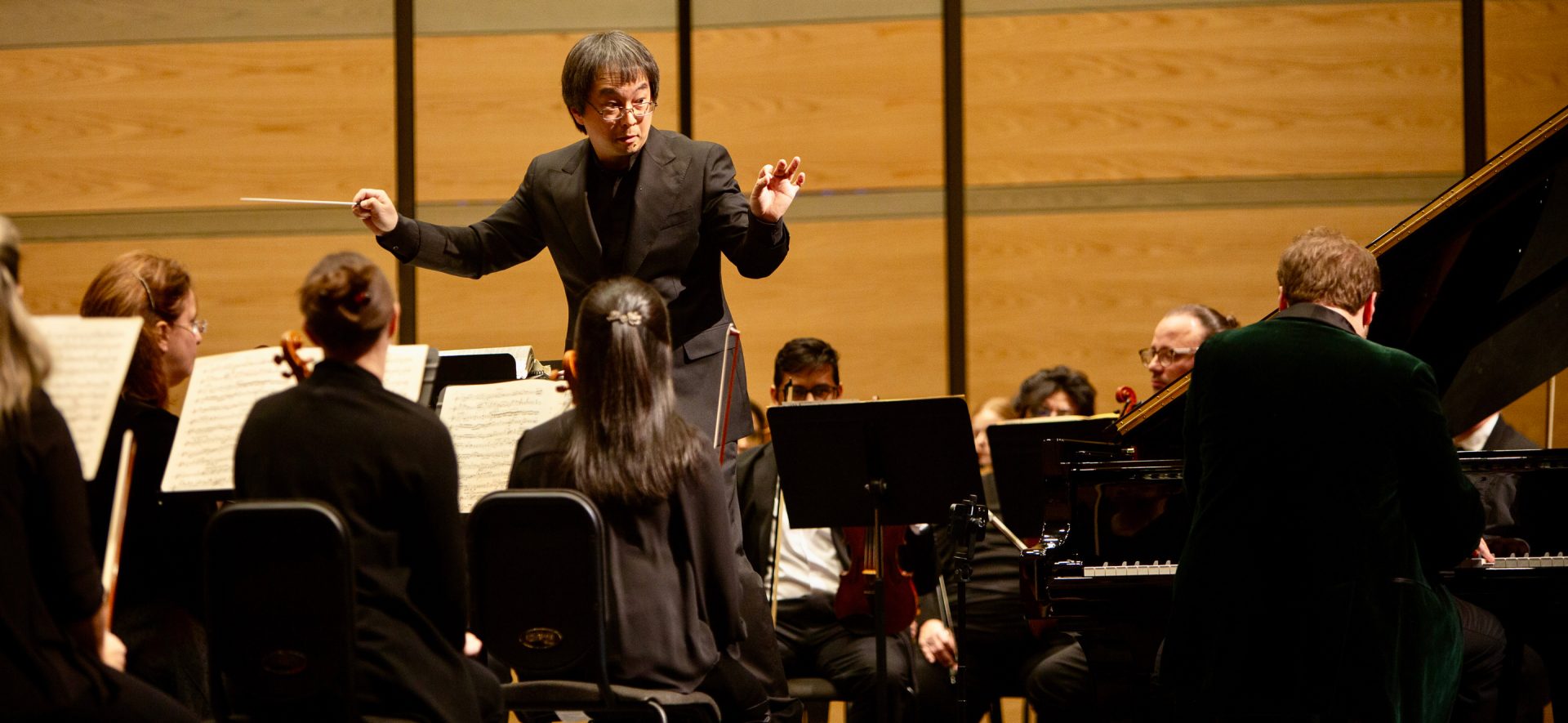
He saw many concerts because his parents were large supporters of the University of Southern California music program. They’d take the family to the university’s symphony and ensemble performances and even the occasional masterclass.
Over the years, Cho’s piano skills flourished. Realizing he’d go further behind the piano than home plate, he enrolled at Oberlin College and Conservatory in Ohio where he earned a bachelor’s degree in piano performance. Then he moved further east to the Peabody Institute at Johns Hopkins University in Baltimore.
“I learned … I had so much fun making music with others. There was a lot of pressure in a solo performance career,” Cho said.
The move to conducting was influenced by his time on a Little League field.
“I liked playing catcher because you could see the whole field,” Cho said.
Cho studied conducting under Larry Rachleff at Rice University’s Shepherd School of Music in Houston.
“Larry taught me to speak less and show more,” Cho said.
Cho learned to express what he needed from musicians through his presence on the podium, not over explaining himself. He took countless masterclasses and received numerous fellowships, including conducting fellow for the New World Symphony in 2003.
One masterclass Cho remembers well was with the famous Leonard Slatkin. He was the son of Felix Slatkin, who founded the Hollywood String Quartet. Slatkin encouraged Cho to explore different conducting techniques, such as conducting with only his hands and no baton. As with any art, there are many styles and subtleties left to each conductor to choose. It’s not an exact science.
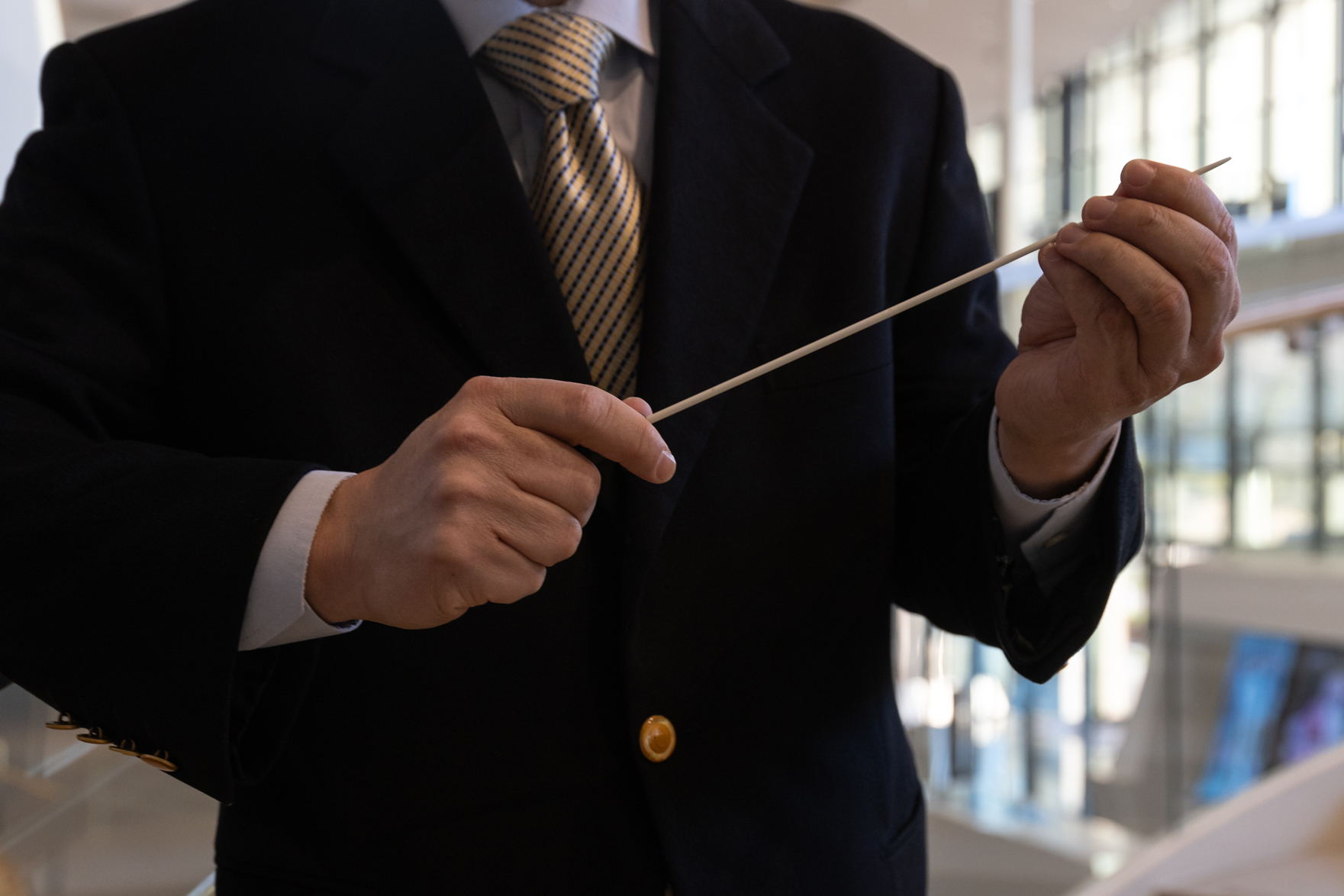
Cho chose to use a baton to increase his presence and precision.
“I come from a subservient culture; politeness is important. Because of that, I had to teach myself early on that I could never over-conduct,” he said.
Wherever he felt he was emoting grand, spacious directions, they were never as large as he thought. For Cho, he always conducts a few notches up from what feels natural to him.
But in his early days of study, Cho was terrified to give the first down beat.
“Once you do, you’re no longer in control,” he said.
But control was an allusion Cho would soon see through, both on the podium and off.
Elegy
While Cho’s career was on the rise, John’s health was rapidly declining.
“My father didn’t take the best care of himself, which led to complications,” he said.
John was an extrovert. Cho remembers his parents often hosting lavish dinner parties for their colleagues and friends. The best food, best wine and thoughtful conversation. Cho was too young for many of those gatherings, but he remembers the joy in his father’s eyes when surrounded by friends.
“My father lived a very full life,” Cho said.
That life abruptly ended at 54. His kidneys began to fail and Cho’s father was on dialysis for the last nine months of his life. He caught a common cold and never woke up.
Cho and his family knew the end was coming, but a presence so large, snuffed out so early, was devastating. Whatever his father did in life, he poured all of himself into the adventure.
“I take after my mother. Clumsy as all heck and much more introverted,” he said.
That hasn’t kept Cho from becoming a conductor and the related social responsibilities. As far as the clumsiness, Cho has broken a baton or two, but chalks that up to passion.
“But knowing my dad lived vicariously through me, I studied even more diligently. I wanted to honor his legacy of loving great music,” Cho said.
Homecoming
A few years after his father’s death, Cho became the associate conductor of the Utah Symphony & Opera in 2006 in Salt Lake City. During that time, he won first prize at the Eduardo Mata International Conducting Competition. This led to invitations to conduct in Europe, Asia and South America.
In 2011, the Lubbock Symphony Orchestra (LSO) started looking for its next director of music. The previous conductor had finished five years with the organization – the average amount of time conductors stayed with the LSO – some of them not living locally, but commuting in.
The symphony’s first conductor, William Harrod, was a WWII veteran who settled in Lubbock after the war. Lubbock was his family’s home for 40 years until his retirement in 1985. Since that time, the longest a conductor had been with the symphony was six years. This isn’t particularly rare for conductors.
Relationships in Lubbock are important.
“You can’t do the things we do without the face of the symphony being out in the community,” said Courtney Jordan, the symphony’s director of development. “David has endeared himself to the public.”
Cho said, “Lubbock felt like a homecoming when I arrived. I’ve been here for almost 13 years, but it feels like 13 months. I’ve loved every minute.”
Cho’s contract was recently renewed through the 2027 season. He has no interest in relocating, even though he could.
That’s not what he’s after.
“I don’t know people who exude the wonderful human qualities that Lubbockites do,” he said.
Since his move to West Texas, Cho has embedded himself in the community. He lives in Lubbock full time, allowing him to gain a deeper understanding of the area, its people, businesses and schools.
Cho once told Jordan how dreadfully afraid he was of public speaking. Today, that’s hard for her to imagine.
“There is a family who supports the symphony, and they don’t even listen to classical music. They give because of David and the relationship he’s built with them,” she said.
Lubbock is fortunate to have Cho’s artistry and his year-round presence, Jordan said. His consistent service in the community has been invaluable to the organization.
“As a conductor, I am the conduit in which music flows from the musicians to the audience,” Cho said.
He wants to be connected to both sides of that exchange.
And while larger cities have symphonies staffed with only full-time musicians, Cho doesn’t always see that as the ideal.
LSO has some full-time professionals such as Texas Tech music faculty, but other musicians have day jobs as bankers or lawyers. These seasoned musicians account for more than half of the group, he said.
“About 40 percent of our symphony is made up of Texas Tech students,” Cho said.
Leading a mixed-generation ensemble is something Cho enjoys.
“When you have all professionals, the group can lack enthusiasm,” he said. “But when you have students, there is such excitement. It goes from ‘Oh, we’re playing this again,’ to ‘Oh my gosh, we’re going to play Beethoven’s fourth.’”
It’s a symbiotic relationship. The students bring excitement to the veteran players and the veteran players have experience to share with the students, Cho said.
Something beyond us
Much like his father, Cho loves good music and good wine.
Both require hard work, time, study and serendipitous fortune.
Cho’s favorite wine is pinot noir. But from harvesting to bottling, a hundred little things must go the right way.
Similarly in symphonic music, tempo, timbre, energy, technique, communication, practice and countless other factors must come together to create a remarkable musical performance.
“We’re not after a perfect engineered sound. There has to be humanity in it. We all make mistakes, so that’s part of the equation,” Cho said.
He just hopes most mistakes happen in rehearsal.
The musicians spend substantial time with the material before coming to rehearsal. Then the group spends an average of 10 hours in rehearsals before opening night. Cho listens for moments that might be problematic. He’s fine tuning.
It’s expected the musicians have practiced enough that the group can focus on creative interpretation of the work or phrasing, not basic technique.
Over the years, Cho has come to understand the mark of a great conductor is reacting to the music, not controlling it.
“I had a great professor who used to say, ‘Just give the downbeat and see what happens,’” Cho said. “I think there’s so much truth to that, because once you give that downbeat, everyone has to react to what happens next. Both myself and the musicians.”
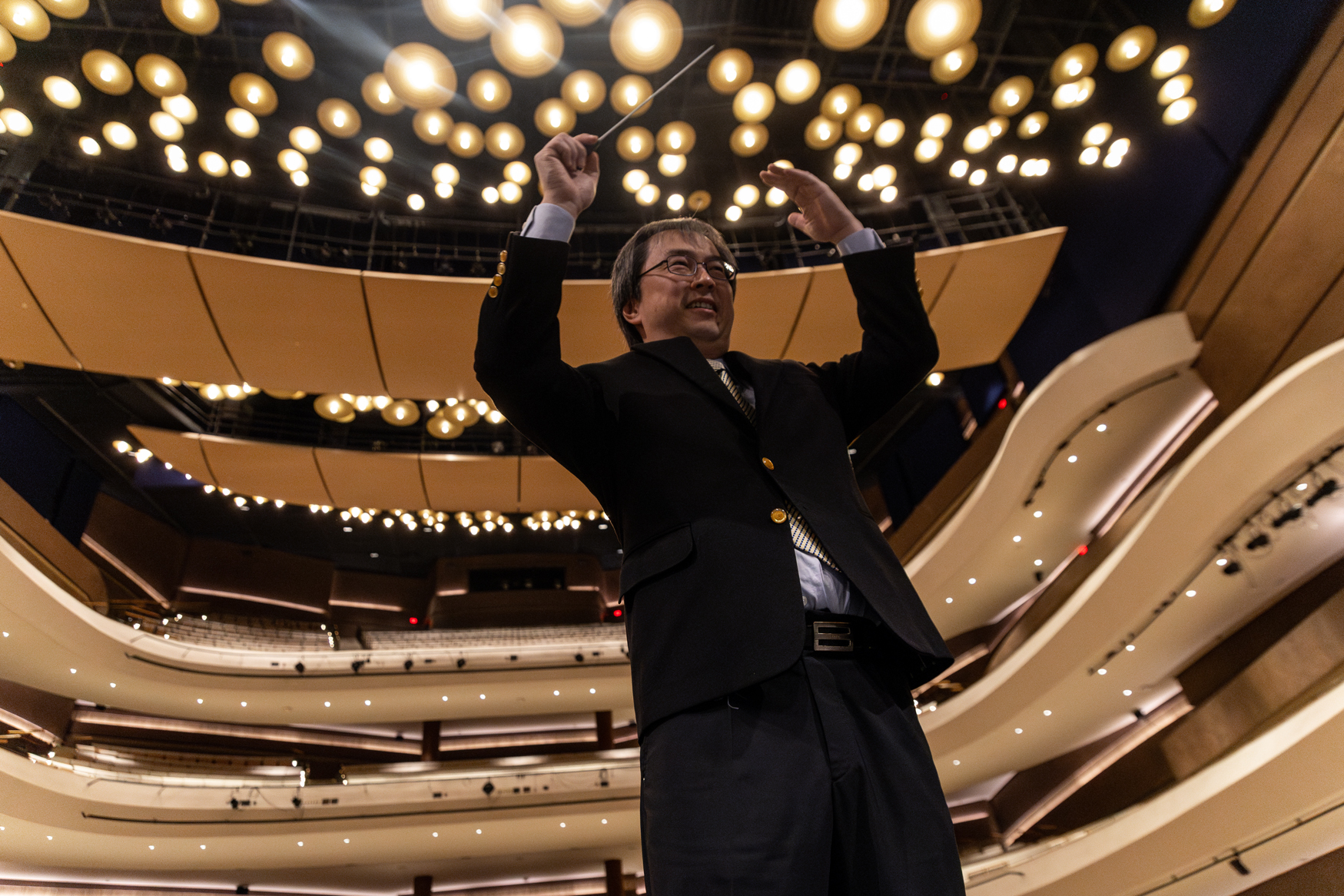
Concertmaster Annie Boyle said Cho’s artistry and his spontaneity are some reasons she enjoys working with him.
“A lot of conductors are conducting a recording they’re trying to emulate,” Boyle said.
“Sometimes you see them going through the motions and they’re not really listening to what’s coming out because in their mind, they’re listening for a recording they’ve heard. But David does an exceptional job of going with the flow and allowing art to be created in the moment,” Boyle said.
She’s also impressed with his wine knowledge. He’s studying to be a certified specialist of wine.
“The pinot noir I enjoy most is from a region in France known as Burgundy,” Cho said.
When it comes to the pinot, Burgundy had one of the best years in a century in 2015. The finickiness of the grape requires cool but not freezing temperatures. It’s also especially sensitive to wind and vine disease.
In 2015, all the elements came together. However, a few years prior, critics said that “the distasteful notes made spitting it out the most enjoyable part of the tasting,” according to wine expert Antonio Galloni.
Cho leads musicians through the exact same program from one night to the next and no two performances are ever the same. Music, like wine, is enjoyable because when it comes together, there’s nothing like it, he said.
“We try to do justice to the music. We put our blood, sweat and tears into it. But I also think there is some element of the Divine. Something beyond us,” Cho said.
Cho is a spiritual man but also just a bit superstitious about his pre-concert ritual.
Three deep breaths.
One prayer.
And he always steps onto the stage with his right foot first.
It’s his own version of the lucky socks or pendants he grew up watching baseball players wear.
Into the next chapter
When Cho renewed his LSO contract for another three years, he had a few big goals in mind.
First, he envisions the Lubbock Youth Symphony Orchestra (LYSO) coming further under LSO’s umbrella. The youth symphony was once part of LSO but separated into its own organization for many years. Two years ago, it was brought back.
“I’d like us to do more side-by-side concerts and expand that relationship. This would help build relationships on both sides and give our musicians chances to coach,” he said.
Cho’s also advocating to raise musician pay up to the national pay scale. He explains the symphony has a healthy endowment already and has grown tremendously with the generosity of community donors. But with inflation and cost of living on the rise, Cho wants to pay musicians more competitively.
“Especially our students who I know are working three of four jobs to make ends meet. I want them to feel they can be 100 percent committed to their craft,” he said.
The final item on Cho’s radar is to continue increasing community engagement.
Lubbock’s symphony attendance took a hit during COVID-19, as did most performing arts nationwide. While LSO has returned from the hardest years in its history, they are now in the new Buddy Holly Hall of Performing Arts and Sciences. Prior to its move, the symphony played across the street at the Lubbock Municipal Civic Center auditorium with 1,395 seats.
The Buddy Holly Hall has 2,290.
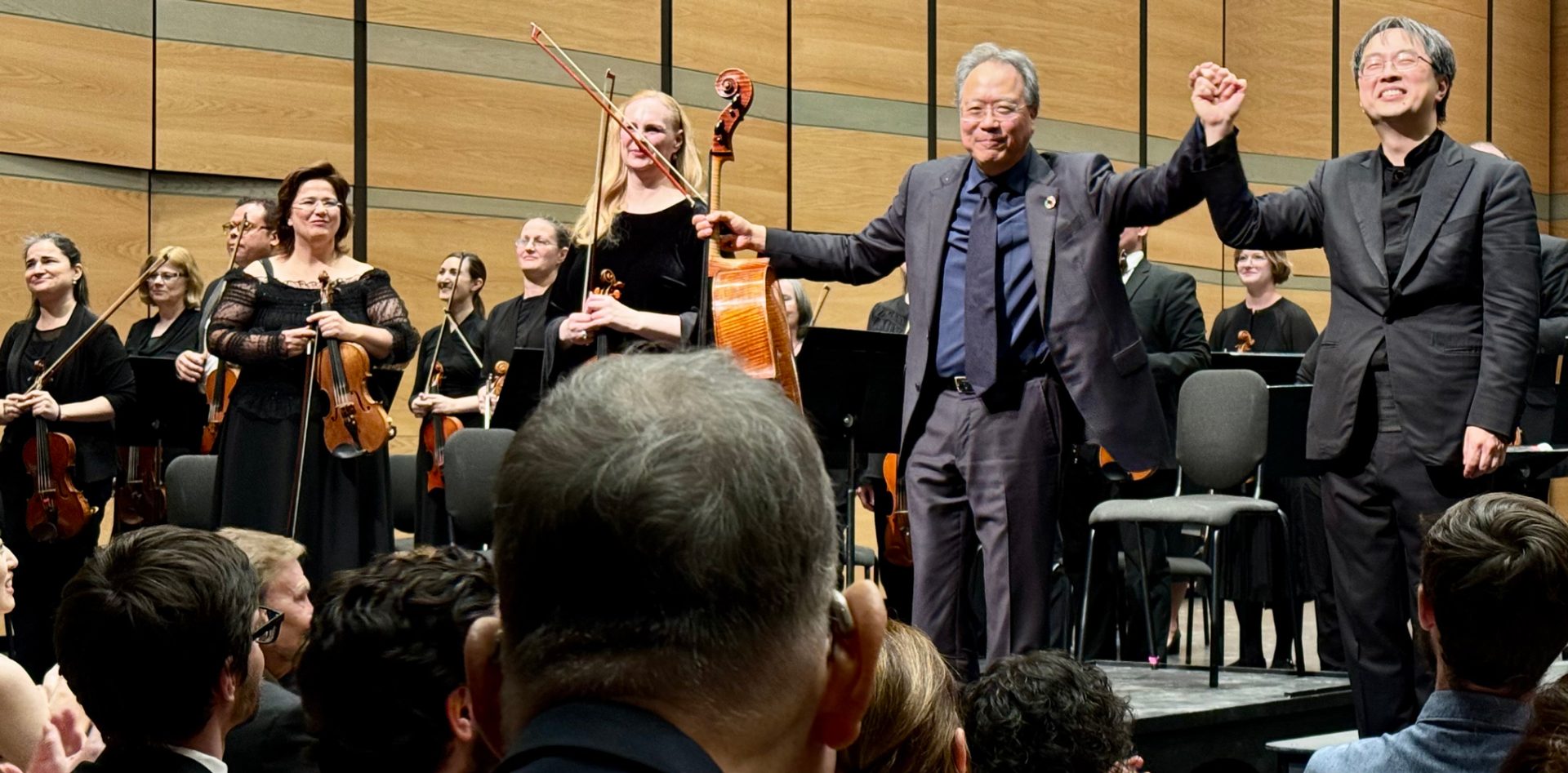
It’s a challenge and opportunity. Cho wants to play to sold-out crowds, and he’s confident they’re on their way to that.
In the past three years, Cho and the LSO team have come up with new ideas, even risks, that are paying off. Like the New York Philharmonic, Cleveland Orchestra and Pittsburgh Symphony Orchestra, the Lubbock Symphony has added film soundtracks to its annual offerings.
In May, the symphony played to a sold-out hall as they performed John Williams’ soundtrack for “Star Wars: Episode IV – A New Hope.”
“Audiences can expect us to continue the Star Wars films, but we’re also planning on adding Harry Potter next season,” Cho said, with excitement.
The symphony also brought in guest artists from multiple genres to play with its musicians. Kristin Chenoweth, Isabel Marie Sanchez, MiG Ayesa and Boyz II Men are a few examples.
But most programs are still from the classical canon.
Earlier this year, Cho was joined on stage by world-renowned cellist and Grammy winner Yo-Yo Ma. Cho has also collaborated with other classical talents such as Joshua Bell, Maja Bogdanovic, Simone Porter and Renée Fleming.
Offering hope
For Cho, life comes down to two things – fun and hope.
“If the Lord allows me to continue doing the things I have fun doing, I will consider myself very blessed,” he said.
“When you have fun, it brings out qualities you never thought you had,” he said.
Growth and fun go together.
Then there’s hope. Cho hopes music continues to lift him up, to elevate musicians and audiences alike. To connect people who never thought they could be connected. To grow a community. To offer a balm in what can be a turbulent world.
“I want to offer that hope,” he said.
Cho remembers the feeling he had listening to musicians play under Bernstein in 1979.
He remembers the hope it instilled in him, even if he didn’t know the meaning of hope yet. He felt it before he understood it.
“Bernstein was jumping all over the place, he was quite the showman,” Cho recalls, laughing.
Bernstein, 61 at the time, was immersed in the music.
David Cho didn’t know he was looking at his future – the tantalizing illusion of control; knowing after that down beat comes, anything could happen.
Comment, react or share on our Facebook post.

